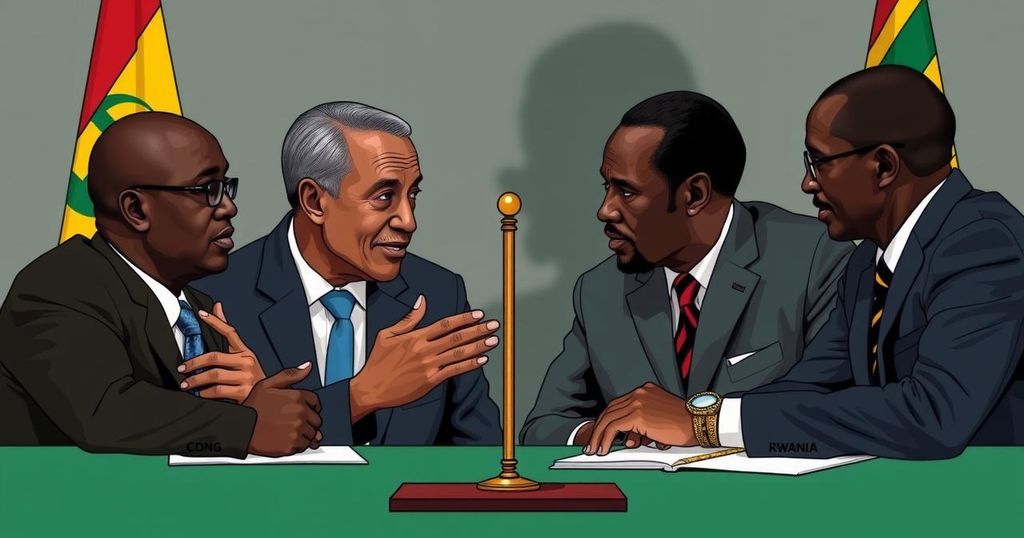The withdrawal of Congo and Rwanda from peace talks in Angola represents a significant setback for addressing the ongoing M23 conflict. The M23 group’s activities have exacerbated the human rights crisis, with deep-seated ethnic tensions reflecting the aftermath of the 1994 Rwandan Genocide. The failure to resolve these tensions necessitates urgent re-engagement in diplomatic discussions to prevent further humanitarian deterioration.
On December 15th, both the Democratic Republic of Congo (DRC) and Rwanda announced their withdrawal from scheduled peace talks in Angola aimed at resolving the ongoing M23 rebel conflict. The M23 group, which has been active in Eastern Congo since its formation in 2012, consists mainly of Tutsi defectors from the Congolese army and has significantly worsened the human rights situation, leading to increased violence against civilians. The backdrop of this conflict involves deep-rooted ethnic tensions following the 1994 Rwandan Genocide, affecting both nations’ stability and security. Rwanda’s advocacy for dialogue with M23 raises concerns in Congo about possible complicity in the rebel activities, as Rwanda seeks to counter perceived threats from Hutu groups operating in Eastern Congo.
A statement from Congolese spokesman Giscard Kusema indicated that Rwanda has conditioned any agreement on the requirement for a direct dialogue between Congo and the M23, which the Congolese government finds unacceptable. Reports allege that Rwanda has provided support to M23, with significant troop presence in Congolese territory, a claim Rwanda denies, asserting that their military presence is purely for self-defense. The failure to re-engage in negotiations poses a risk of further deterioration of the humanitarian crisis, as ongoing hostilities impact education and health services for civilians in the area.
The missed opportunity for dialogue in Angola highlights the urgent need for a renewed peace process that addresses the fundamental concerns of both parties. Key steps include establishing mutual trust by clearly outlining terms for peace and increased involvement from international organizations such as the United Nations and the African Union. These bodies can serve as impartial mediators, which may facilitate meaningful discussions and validate the withdrawal of armed forces from vulnerable regions. Such actions are crucial for instigating a resolution to the conflict and addressing the underlying structures that fuel hostility.
In conclusion, the decision by Congo and Rwanda to withdraw from peace talks in Angola represents a significant setback in efforts to quell the violence stemming from the M23 conflict. Continuous failure to engage in constructive dialogue may lead to an exacerbation of the humanitarian crisis and further destabilization in the region. To avert this bleak scenario, proactive measures towards a ceasefire and comprehensive peace negotiations are imperative.
The ongoing conflict in the Democratic Republic of Congo (DRC) is largely attributed to the activities of the M23 rebel group, which arose from tensions stemming from the 1994 Rwandan Genocide. This conflict has led to severe human rights abuses, displacement of civilians, and an ongoing humanitarian crisis. Rwanda’s involvement in the negotiations has complicated relations, as suspicions arise regarding their support of rebel factions within the DRC. The region’s history of ethnic strife continues to influence the political landscape, necessitating new approaches to peacebuilding.
The withdrawal from peace negotiations deepens the crisis between the DRC and M23, exacerbating humanitarian conditions. Genuine efforts toward dialogue, facilitated by international mediators, are essential to establish trust and confront the roots of the conflict. Engaging in diplomatic solutions is not just a matter of regional stability but is critical for the well-being of vulnerable populations suffering in the conflict’s wake.
Original Source: theowp.org






